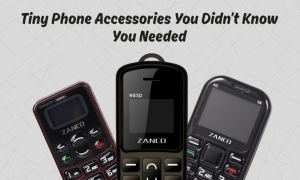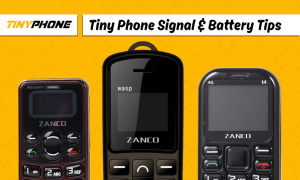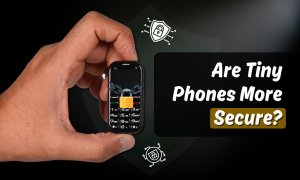
Mini phones have gained a lot of attention in recent years for their compact design and portability. These devices pack significant functionality into a small form factor, making them ideal for users who prefer smaller, simpler phones. In this article, we’ll explore the benefits and limitations of mini phones, helping you decide if one is right for you.
The Benefits of Mini Phones
Mini phones are celebrated for their small size, which makes them extremely portable and easy to carry around. Here’s a look at why these compact devices have become so popular:
Portability
The main selling point of Tiny phones is their size. These phones fit comfortably in your pocket, purse, or even your hand. Whether you’re traveling, commuting, or just need something lightweight, small mobile phones are easy to carry wherever you go.
Simplicity and Ease of mini phones
Mini phones are perfect for people who don’t need all the bells and whistles of a larger smartphone. They usually come with basic functions such as calling, texting, and light browsing. Their simplified design often appeals to minimalists or anyone looking to reduce screen time.
Longer Battery Life
Because mini phones come with smaller, less demanding screens and processors, they tend to have longer battery life compared to larger smartphones. This can be a huge benefit for anyone who wants a phone that lasts longer without constantly needing to recharge.
Less Expensive
Mini phones are typically more affordable than their larger counterparts, making them a great option for those on a budget. Whether you’re looking for a secondary device or a phone that covers basic needs, these compact smartphones often offer good value for money.
Ideal for Seniors and Kids
Because of their easy-to-use interface, compact size, and longer battery life, Tiny phones are a popular choice for seniors and children. They can provide a straightforward mobile experience without the complexity of advanced smartphone features.
Limitations of Mini Phones
While mini phones have many advantages, they also come with their own set of limitations. It’s important to understand these potential drawbacks before deciding if a Tiny phone is right for you:
Small Screen Size
The small screen size is one of the most significant limitations of mini phones. While it makes them portable, it can also make tasks like watching videos, browsing the web, or playing games a less enjoyable experience. The limited screen real estate can be restrictive for those who like to consume media or use apps that require more space.
Limited Processing Power
Because Tiny phones are designed to be compact and affordable, they often come with less powerful processors. This means that they may not be suitable for tasks that demand high processing power, such as gaming or using resource-intensive apps.
Reduced Storage Space
Most mini phones come with limited storage options, which could be a dealbreaker for people who like to store music, videos, or a variety of apps on their device. While some models offer expandable storage, it’s important to check the storage capacity before purchasing if you have specific needs.
Mini Phones Limited Features
Mini phones often lack advanced features found in larger smartphones, such as high-end cameras, powerful processors, and larger batteries. If you’re someone who needs a device for work, streaming, or creative projects, a small phone might not meet your expectations.
Not Ideal for Gaming
If you enjoy gaming on your phone, a mini phone may not be the best choice. Small phones typically have smaller screens and less powerful hardware, which can affect the gaming experience. The limited space and processing power might result in a less-than-ideal performance.
Who Should Consider a Mini Phone?
Tiny phones are ideal for specific user groups. Here are a few scenarios where a mini phone could be the perfect solution:
- Minimalists: Those who prefer a simple, easy-to-use device that covers basic needs like calling and texting.
- Seniors: Older adults who want a phone with fewer features but still want to stay connected.
- Secondary Device Users: People who already own a primary smartphone and need a backup phone that’s lightweight and portable.
- Budget-Conscious Users: Those who don’t need all the high-end features of a flagship phone and prefer to save money.
- Travelers: People who want a portable device that’s easy to carry around during their travels.
Is a tiny Phone Right for You?
Choosing between a mini phone and a larger smartphone ultimately depends on your individual needs. If you value portability, simplicity, and affordable pricing, a tiny phone could be a great choice. However, if you rely heavily on your phone for gaming, media consumption, or advanced apps, you may find a larger smartphone more suitable.
Tiny phones are perfect for light users and those looking for a straightforward device that gets the job done without extra distractions. If you need more screen real estate or a more powerful device, you may want to look into a full-sized smartphone instead.
Mini phones have smaller screens, making them less ideal for watching movies or videos for long periods. For better viewing experiences, consider a larger screen tablet or smartphone.
While you can play games on mini phones, the limited processing power and smaller screen may not provide the best gaming experience. For mobile gaming, larger devices with better hardware are recommended.
Mini phones typically offer longer battery life than larger smartphones due to their smaller screens and less powerful components. Expect a full day of use for light tasks.
Yes, mini phones are perfect for seniors who want a simple device for calls, texts, and light browsing. Their compact size and ease of use make them an ideal option.
Mini phones can handle basic apps, like social media, messaging, and weather apps, but they may struggle with more complex or resource-intensive apps like gaming or video editing.




